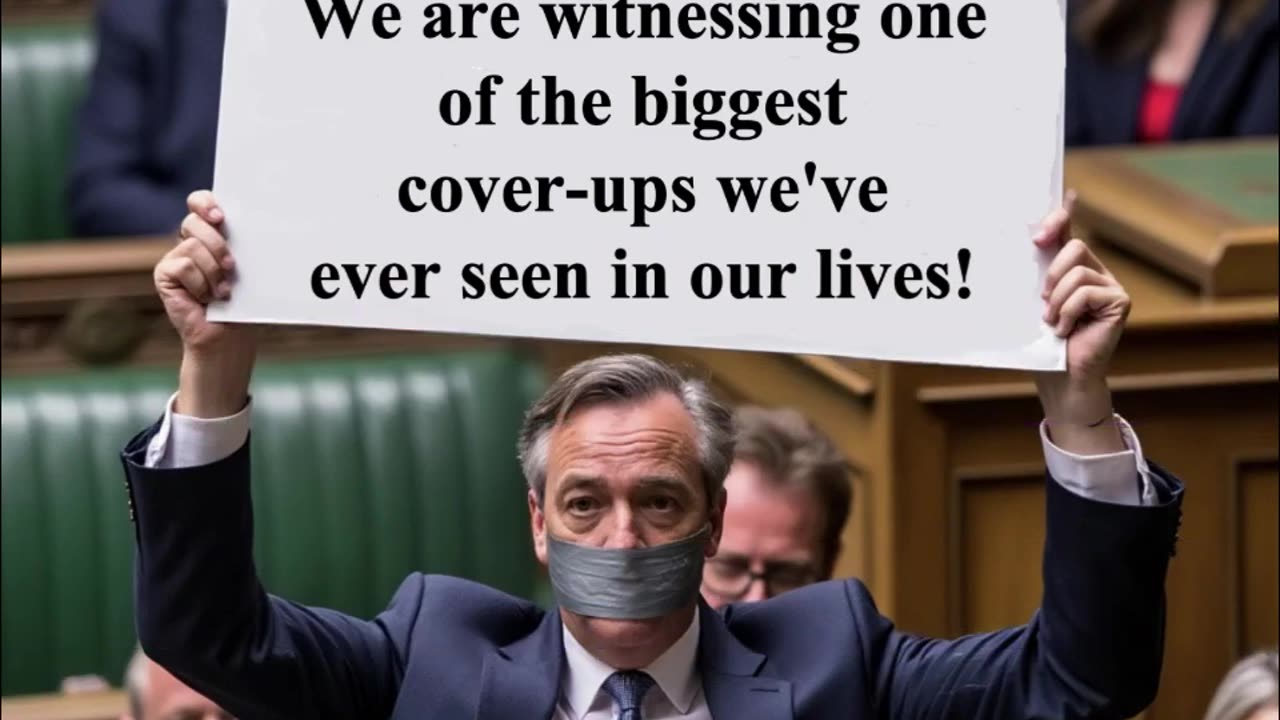Premium Only Content

"Silenced Truths: Nigel Farage’s Alarming Claim of a Major Cover-Up in the Southport Attack"
READ MORE -
https://x.com/KingArthurII2/status/1858118162685825456
Nigel Farage, known for his vocal leadership in the Brexit movement and as leader of the UK Freedom Party, recently made a statement that has raised questions and sparked intense debate. He asserted that he knows “a hell of a lot more” than the British public regarding the recent attack in Southport but has been “silenced,” implying the existence of a major cover-up. He went so far as to call this one of the most significant cover-ups in “our lives.”
Context of the Southport Attack.
To fully understand the weight of Farage’s comments, one must first look at the nature of the Southport attack itself. Details surrounding the event remain scarce, fueling public speculation and media attention. Initial reports suggested it was a significant incident involving multiple agencies, but beyond that, information has been limited. The lack of transparency and the contradictory narratives between official channels and independent reports have made it a fertile ground for conjecture.
The Concept of Being ‘Silenced.’
The notion of being silenced is not unfamiliar to Farage. Throughout his political career, he has often positioned himself as an anti-establishment figure, frequently claiming that mainstream channels seek to stifle voices that challenge the status quo. His recent remarks suggest a suppression of truth that extends beyond typical media control into the realms of national security and political discretion.
But why would Farage be “silenced” about this event, and who would stand to benefit from suppressing the details of an attack? To answer that, it’s important to understand the power dynamics at play.
The Nature of Political Cover-Ups.
Political cover-ups occur when information is deliberately hidden from the public, often justified as being in the interest of national security or to prevent public panic. While some secrecy can be warranted, when the justification for such actions becomes blurred, the public’s trust erodes. Farage’s statement—“We are witnessing one of the biggest cover-ups in our lives”—suggests a deeper, more systemic issue, hinting at layers of bureaucracy or powerful entities that may be protecting certain interests.
Historically, instances like the Watergate scandal or classified military operations during the Cold War serve as examples of how governments have kept the public in the dark under the pretence of necessity. Farage’s assertion implies that the Southport incident could potentially fall into a similar category: an event where the narrative is controlled, key information withheld, and whistleblowers silenced.
What Farage’s Statement Could Mean?
If Farage’s claims hold weight, the implications are significant. The statement suggests a deliberate and coordinated effort to prevent information from reaching the public. There are a few potential scenarios to consider:
1. National Security Concerns: The event might involve sensitive details related to terrorism, espionage, or international relations that authorities believe could endanger the public or national security if disclosed. Farage’s comment could imply that even he, a seasoned politician, was privy to intelligence so crucial that discussing it openly posed significant risks.
2. Protecting Institutional Interests: The cover-up might not only be about public safety but could also be about protecting the reputation of key institutions or political figures. Exposing failures or mishandled responses in high-profile cases can erode confidence in leadership, which governments may seek to avoid, especially in times of political tension.
3. Challenging the Status Quo: Farage’s narrative aligns with his long-standing critique of the establishment. His claim that he has been silenced could reinforce the notion that there is a system in place that limits dissenting voices, even if they come from prominent politicians. The cover-up could signify the lengths to which power structures are willing to go to maintain control over the narrative.
Public Reaction and Ramifications.
Public reaction to Farage’s statement has been mixed. Supporters argue that his words validate their suspicions of government overreach and media complicity, while critics question the lack of substantial evidence to back such claims. The ambiguous nature of his statement—pointing to a cover-up without disclosing verifiable facts—both stirs intrigue and invites scepticism.
Should more information come to light proving Farage’s assertion, the ramifications could be profound, leading to public inquiries and a crisis of trust in governmental transparency. On the other hand, if his claims remain unsubstantiated, it could lead to accusations of fear-mongering, deepening political divides.
Conclusion.
Nigel Farage’s remark that he knows “a hell of a lot more” about the Southport attack, coupled with his declaration of being silenced, paints a picture of a complex and potentially alarming situation. While the public awaits clarity, his statement serves as a reminder of the tension between state transparency and national security, as well as the power struggles within political narratives. Whether this is indeed one of the “biggest cover-ups of our lives” remains to be seen, but it undeniably provokes important questions about who controls the flow of information and why.
-
 2:16:57
2:16:57
XxXAztecwarrior
2 hours agoSearching for more Reds!!
5.94K -

TheItalianCEO
3 hours agoWhat about an Italian for breakfast?
8.54K -
 9:06
9:06
nospeedlimitgermany
1 day ago $1.16 earnedMercedes-Benz 500 SE W126 | 231 PS | Top Speed Drive German Autobahn No Speed Limit POV
13.8K2 -
 LIVE
LIVE
IamNibz
5 hours ago $0.53 earnedLaw 56- Elden Ring Challenge (PC)
80 watching -
 39:33
39:33
Chris Harden
7 days ago $1.84 earnedKansas Backroads | What's Really Out Here? - Rush County
9.04K13 -
 23:49
23:49
marcushouse
1 day ago $1.08 earnedStarship Flight 10 Secrets Revealed & Future of Starbase! 🔥
9.5K6 -
 3:00
3:00
scoutthedoggie
1 day agoNovritsch SSG-96 Mk2 Airsoft Sniper Rifle
9.79K -
 2:07:31
2:07:31
The Connect: With Johnny Mitchell
23 hours ago $25.00 earnedSecrets Of The Cocaine Cowboys: Miami Drug Lord Reveals Truth About His BILLION-DOLLAR Coke Empire
154K15 -
 21:20
21:20
AndresRestart
19 hours ago $0.64 earnedNintendo's GENIUS Mario & Zelda 40th Anniversary Plan!?
20.6K4 -
 10:35
10:35
Blackstone Griddles
19 hours agoPerfect Ribeye Every Time | Blackstone Griddles
6.05K2